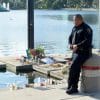The Pulse nightclub shooting occurred 6 months ago, but Orlando officers on the scene are still reminded of that tragic day as they go about their everyday lives. The New York Times spoke to officers Omar Delgado and Gerry Realin to expose the difficulties of moving on after witnessing events like this in person.

Mr. Delgado still suffers flashbacks from simple instances, like his cell ringing. He is instantly in the nightclub, hearing the victims’ cell phones ring constantly with loved ones trying to reach them. “I literally felt like I was standing at the club, my feet hurting, my arm hurting from holding my weapon”, he says about an instance when his phone rang on the job.
He tried to return to work, but it became too dangerous for him due to his constant flashbacks while in the field. He recalls chasing a suspect over the 4th of July weekend when hearing a loud sound, he was transported to the explosion that destroyed the Pulse Nightclub gunman’s car. “If my finger had been on the trigger, I would have shot my foot off,” he says about holding his weapon while suffering flashbacks.
The dark side of his heroic act is he now suffers from PTSD but has limited resources to help him combat these terrible side effects. He used up all his sick days going to therapy, and even though the police department is paying his base salary, it is not enough. He is losing $1,000 a month because he worked overtime to help compensate for his salary.
Another officer, Gerry Realin, is having the same experience. He spent 4 hours inside the nightclub identifying and tallying bodies. Common objects remind him of the horrendous event: sharpies from listing the victims on the board and masks like the one he used to keep blood off his face. These small things give him crippling anxiety hindering his ability to work in the field.

His wife has seen the change in him. “The man who went to Pulse that day is not the same one who came home,” his wife said. “He shuts down, turns a different color; his breathing changes.”
He is also receiving his base salary, but since he is not working overtime either, he is losing $600 a month. In trying to deal with his PTSD, he has used all his sick time and took out a loan from his retirement.
Both officers applied for the OneOrlando Fund, set up to help individuals involved in the shooting, but the criteria is stringent. Since, they were outside the club when the shooting began they were denied any compensation from the fund, despite being in nightclub afterwards, for hours trying to resolve the situation.
The administrator of the fund, Kenneth Feinberg, addresses the complexities of distributing the money. “Had the fund included the rush of police officers, firefighters and paramedics who were among the first to respond to the scene, it would have had to add a few dozen more people to split a finite amount of money, diminishing its impact.”
The officers, with their lawyer, are lobbying state legislators to change Florida law so officers and firefighters suffering from PTSD have their salaries paid and receive the assistance they need. Some states have resisted because it could cause a large financial burden.
Hopefully, through their lobbying, positive change will be made in both legislation and health services so first responders receive the help they need in a timely manner.


Leave a Reply